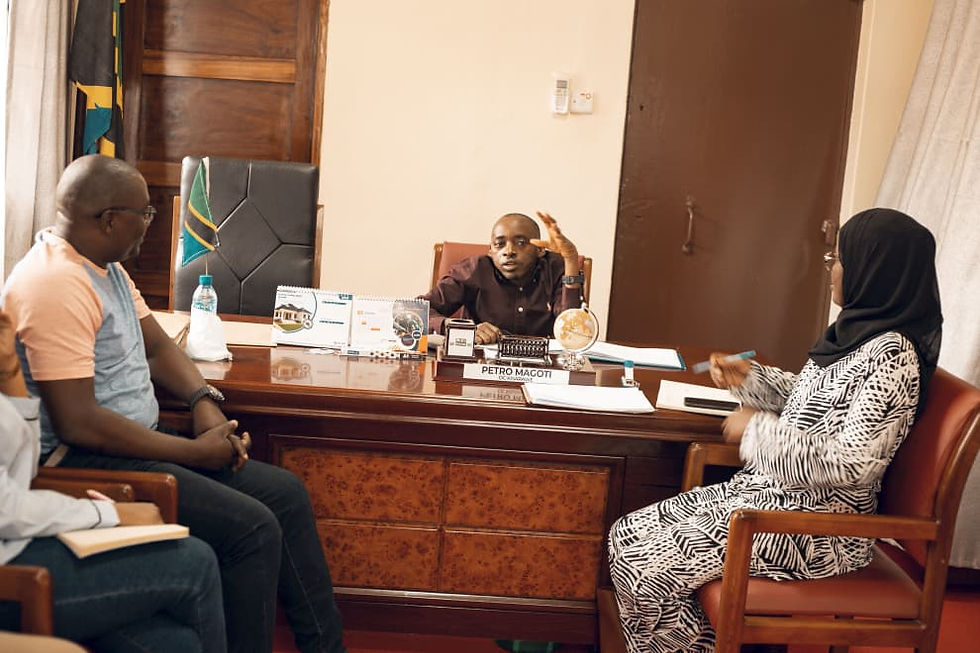How Zanzibar communities are rewriting the story of protection.
- C-Sema Team
- Sep 1, 2025
- 3 min read
Updated: Sep 18, 2025

In August 2025, the Chaguo Langu Haki Yangu (CLHY) program brought government leaders, teachers, police officers, parents, and even children into one room in Unguja and Pemba. These gatherings weren’t just meetings they felt like milestones, marking how far communities have come in protecting women and children from violence.
From policy shifts to village sermons, the sessions revealed how deeply CLHY has shaped lives: new laws and services are in place, survivors are finding safe spaces, and children themselves are speaking up with newfound confidence.
A New Face of Justice
Perhaps the most visible symbol of change is in Unguja Urban, where a brand-new Police Gender and Children’s Desk (PG&CD) has opened its doors. Just a year ago, survivors had to share cramped office space with other services, often feeling exposed and discouraged. Now, a dedicated building stands—safe, dignified, and survivor-centered.
Inside, 20 officers work around the clock.
“Since the PG&CD opened, we finally have a place where survivors can come without fear,” one officer shared.
Already, more than 20 cases have been reported and addressed. Survivors receive counselling the moment they arrive, and through close collaboration with the national Child Helpline 116, cases are referred swiftly for follow-up.
Trust is also being built outside the station walls. Religious leaders, once hesitant, now work side by side with police to encourage survivors and their families to report cases. This collaboration is chipping away at the silence that for years allowed abuse to go unchecked.
Shifts in Daily Life
What stood out most during the field visits were stories of change told by ordinary people. In Pemba, a madrasa teacher recalled how he intervened when one of his students was about to be married off.
“I spoke with the parents, and they agreed to stop the marriage,” he said quietly, his words a powerful reminder of how local leadership saves lives.
Children, too, are carrying the message forward. Teachers say students are now quick to report “bad touch” and know exactly where to go for help. One social welfare officer put it this way:
“Children can stop you at the market or on the road, call you ‘C-Sema’ or ‘116,’ and remind you of the lessons from school.”
Some of the most moving stories were about young people who found new beginnings. A girl rescued from child marriage was supported into a cooking class she now works confidently as a hotel chef. A boy who had dropped out of school joined a garage through CLHY support and is today a trained mechanic. Even once-risky spaces, like Madungu’s boda boda stands, are slowly becoming safe havens for children.
Faith, Family, and Community
Faith leaders have emerged as unexpected champions. Using a pocketbook that combines lessons from the Qur’an and Bible, they preach against violence in mosques and churches alike. Madrasa and Sunday school teachers are being trained not just in scripture, but in children’s psychology, pre-marital counselling, and positive parenting.
Parents, especially mothers, are also taking ownership. Women’s groups now run bi-monthly parenting camps. These gatherings, once rare, are credited with improving school attendance and giving parents tools to spot signs of abuse early.
Not Without Challenges
For all the progress, challenges remain. Survivors still delay reporting or withdraw cases once they reach court, and resource gaps mean some forums lack interpreters or braille materials for disability inclusion. Teachers worry about a new frontier: digital abuse, with children increasingly at risk online or even at home from siblings.
These realities have sparked lessons for the future. Communities are calling for more forensic expertise to strengthen justice, deeper interfaith engagement to shift mindsets, and stronger parenting education to keep pace with the digital world.
Looking Ahead
As CLHY edges toward transition, the call for sustainability is loud and clear. Districts like West Urban are already putting 20% of their budgets toward disability inclusion, while leaders push for institutionalized committees that will outlast the program.
The message, however, came through strongest from the Chakechake District Commissioner:
“Even with strong systems and powerful decision-making positions, if the community lacks knowledge and is unwilling to report, all efforts go in vain. CLHY has shown us that change begins when silence is broken.”
And in Zanzibar, that silence is breaking, one safe space, one sermon, and one child’s voice at a time.
Prepared by C-Sema's Communication Team.



